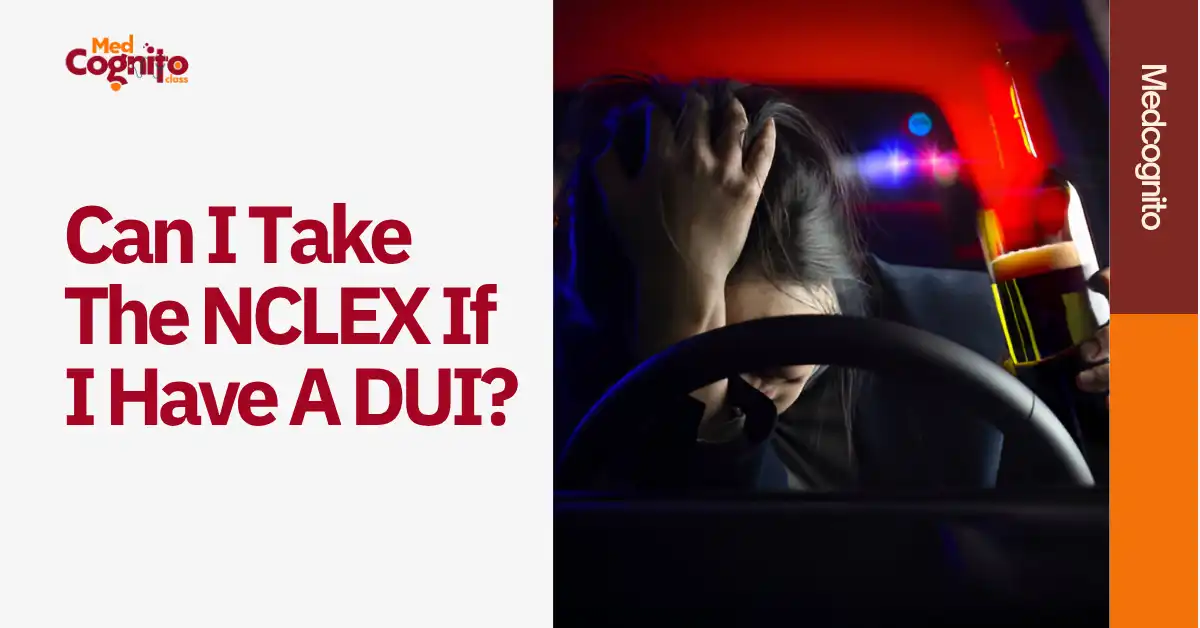Got a DUI and worried it’ll ruin your nursing career before it even begins?
Take a breath. You’re not the first to ask, “Can I take the NCLEX if I have a DUI?” and you won’t be the last.
The short answer: Yes, you often can.
The longer answer? It depends on your state, your specific charges, and what the Board of Nursing (BON) thinks about your case.
But don’t panic. This post will walk you through everything you need to know, with clarity and no sugar-coating.
Table of Contents
ToggleCan You Take the NCLEX with a DUI? Yes, But It’s Complicated
A DUI (Driving Under the Influence) is a criminal offense, and nursing boards take any legal issue seriously, especially one that relates to judgment, safety, and substance use.
That said, a DUI does not automatically disqualify you from taking the NCLEX or becoming a nurse.
What matters most:
- Was it a conviction or just an arrest?
- Is your case still open, or has it been resolved?
- Are you honest in your application?
How State Boards Handle DUIs: 3 Common Scenarios
Different states, different rules. Here are the three most common ways state BONs approach DUIs during the NCLEX application process:
Category 1: “Convictions Only” States
- These states only ask about criminal convictions, not arrests or pending charges.
- If your DUI case hasn’t reached a verdict, you may not need to disclose anything yet.
- You can typically sit for the NCLEX and deal with the BON after passing.
Example: Some states let you apply and test, but require full disclosure if and when you apply for a license. Always read your state’s application carefully.
Category 2: “Arrest/Charge Disclosure” States
- These states ask about arrests, charges, and convictions.
- If you’ve been arrested, even without a conviction, you’ll need to disclose it.
- You may be required to:
- Submit court documents
- Write a personal statement
- Undergo a Substance Use Disorder (SUD) evaluation
The board will review your honesty, the severity of the incident, and your current fitness to practice.
Category 3: “Case Must Be Resolved” States
- Rare, but some BONs may require your DUI case to be fully closed before you’re allowed to take the NCLEX.
- This delays your timeline but doesn’t mean you’re banned forever.
Tip: Contact your state BON directly or consult a lawyer to clarify your situation.
What the Board of Nursing Will Look For
Regardless of your state, once the BON is made aware of your DUI, they typically evaluate:
- Was this a one-time mistake or a pattern?
- Was there property damage, injury, or other aggravating factors?
- Have you completed probation, treatment, or community service?
- Did you disclose it honestly and early?
Documentation you may need:
- Certified court records
- Final judgment documents
- A notarized personal explanation
- Letters of reference
- Drug or alcohol evaluations, if applicable
Can You Still Go to Nursing School with a DUI?
In most cases, yes.
Many nursing schools accept students with misdemeanor DUIs, especially if:
- It was a first-time offense
- Enough time has passed since the incident
- You’ve shown rehabilitation or growth
Some schools do background checks, others don’t. A few may ask for documentation or expungement. Always ask admissions directly, don’t assume.
And if you’re an international medical graduate (IMG) aiming for nursing school in North America, expect deeper scrutiny of your legal history during visa processing or licensing steps.
What Happens After You Pass the NCLEX With a DUI on Record?
Passing the NCLEX is one step but getting your license is another.
Here’s what may happen:
- You’re placed into a monitoring program (sometimes up to 5 years)
- You’re issued a probationary or restricted license
- You may need regular drug testing or counseling
- You’re flagged for ongoing review
Even if your DUI occurred before you were licensed, the BON can still hold you accountable.
This is where a good lawyer matters. They can often help reduce monitoring time or advocate for your intent to practice safely and ethically.
The Worst Thing You Can Do? Hide It.
Failing to disclose your DUI, even if you’re not technically required to yet, can cost you far more than the offense itself.
Dishonesty, not the DUI, is what gets applications rejected and licenses revoked.
If you’re ever in doubt, disclose, document, and demonstrate growth.
So, Can You Take the NCLEX With a DUI? Yes, If You Own It.
Your DUI may slow down the process. It may even complicate things.
But it doesn’t define your future.
Plenty of nurses have made mistakes, owned them, and gone on to serve patients with deep compassion and integrity. If anything, your story, your comeback, can make you a better nurse.
Get NCLEX-Ready Even After a Setback
If you’re navigating licensing hurdles and need to pass the NCLEX on the first try, MedCognito has your back.
Our NCLEX prep course is designed for real-life students those with responsibilities, challenges, and maybe even a DUI in their past. We’ll help you build the clinical confidence and test strategy you need to move forward.
Pass the exam. Rebuild your future. Start fresh with us.
Frequently Asked Questions
What disqualifies you from taking the NCLEX?
You can be disqualified from taking the NCLEX if you fail to present an acceptable, unexpired form of government-issued ID that exactly matches the name on your registration. Attempting to take the exam under someone else’s name, or having someone else take it for you, will also result in immediate disqualification and potential permanent bans.
Can you become a nurse if you have a DUI on your record?
Yes, you can still become a nurse with a DUI on your record. However, you must disclose it on your RN application, especially if it involved a fine of over $1,000. The Board of Registered Nursing (BRN) will review your case individually. A DUI doesn’t automatically disqualify you, but honesty, rehabilitation, and proof of good conduct will play a key role in their decision.
Can you take the NCLEX exam if you have a misdemeanor?
Yes, you can take the NCLEX with a misdemeanor on your record. However, it may complicate the licensure process. While the misdemeanor won’t automatically disqualify you, the nursing board will review your case closely including the nature of the offense, how long ago it occurred, and whether you’ve demonstrated rehabilitation. Full disclosure is essential.
What prevents you from taking the NCLEX?
You may be prevented from taking the NCLEX if you arrive without proper, valid identification that exactly matches the name on your registration. If your ID doesn’t meet the official requirements, you won’t be admitted and will need to re-register and pay the exam fee again. Other disqualifiers include trying to take the test for someone else or providing false information during registration.






